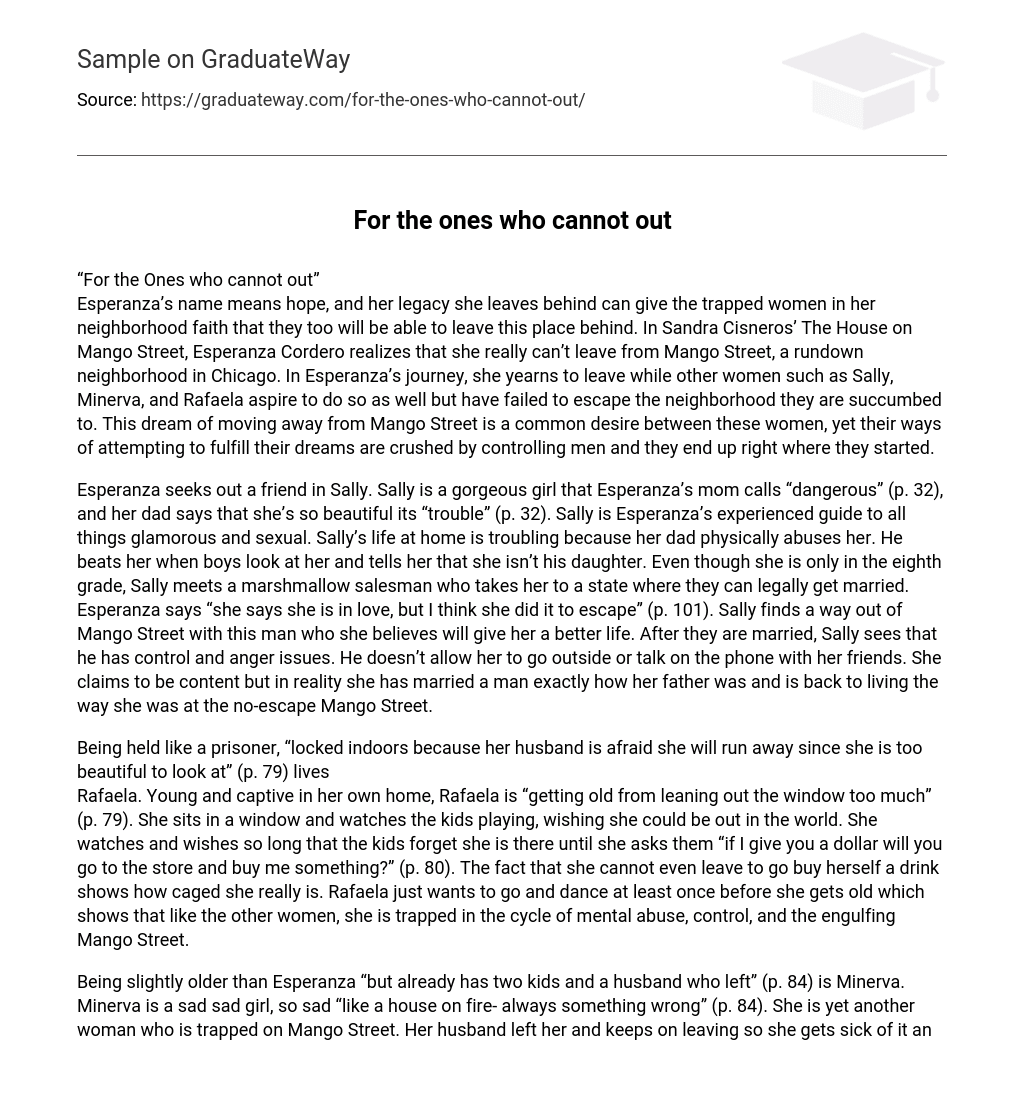“For the Ones who cannot out”
Esperanza’s name, which means hope, symbolizes the possibility of a better future for the trapped women in her neighborhood. They find hope in Esperanza’s own journey, as portrayed in Sandra Cisneros’ The House on Mango Street. Mango Street, a rundown neighborhood in Chicago, becomes a question mark for Esperanza, who realizes she cannot escape its confines. Similarly, other women like Sally, Minerva, and Rafaela also aspire to leave but are unable to do so. Despite sharing the dream of leaving Mango Street, these women are backed into a corner by controlling men and find themselves right where they started.
Esperanza forms a close bond with Sally, who is described as stunning but also labeled “dangerous” by Esperanza’s mother and “trouble” by her father. Despite being in the eighth grade, Sally serves as Esperanza’s guide in the realms of glamour and sexuality. However, Sally’s home life is distressing as she endures physical abuse from her father. He punishes her whenever boys glance her way and denies her paternity. In an attempt to escape her troubled situation, Sally enters into a marriage with a marshmallow salesman, even though Esperanza believes it was more of a getaway than love (p.101). Sally hopes this marriage will provide her with a better life and she manages to leave Mango Street with her new husband. Unfortunately, Sally soon realizes that he is controlling and prone to anger. He restricts her from going outside or talking to her friends on the phone. Sally claims to be content, but in reality, she has married someone similar to her abusive father and is stuck in a cycle resembling her previous life on the inescapable Mango Street.
Being held like a prisoner, Rafaela lives indoors because her husband fears she will run away due to her exceptional beauty (p. 79). She is confined in her own home and has become weary from leaning out the window for too long (p. 79). Despite her captivity, Rafaela yearns to be part of the outside world and spends her time watching children play. Eventually, the children forget about her presence until she must bribe them with a dollar to run an errand for her (p. 80). The fact that she cannot even leave to buy herself a drink highlights how truly trapped she is. All Rafaela desires is the opportunity to go dancing before she ages, revealing that like other women, she too is ensnared in the cycle of mental abuse, control, and the suffocating environment of Mango Street.
Minerva, slightly older than Esperanza but with two kids and a husband who left, is trapped on Mango Street. She is constantly burdened by sadness, always experiencing something wrong. Despite kicking her husband out, she eventually allows him to return home, only to be subjected to physical abuse. Esperanza observes Minerva’s profound unhappiness and the countless losses she has endured at a young age. Uncertain about her future, Esperanza feels helpless in aiding Minerva.
Esperanza has a strong desire for a house that is solely hers, somewhere far from a place like Mango Street where the house she belongs to but does not truly belong resides. Throughout her journey, Esperanza realizes that she cannot become a miserable, shattered woman with no life, sitting by a window yearning for freedom, like Sally, Minerva, and Rafaela. These women also aspired to escape their confined neighborhood but failed to do so. The shared dream of leaving Mango Street united them, but their attempts to fulfill their dreams were crushed by power-hungry, abusive men, resulting in them ending up right back where they started. Esperanza’s name symbolizes hope, and the legacy she will leave behind can provide hope to the women trapped in her neighborhood. She believes that they too will be able to break free from this place when she departs and eventually returns for those she left behind, particularly those who are unable to escape.
References
Cisneros, Sandra. (1991). The House on Mango Street.
New York, NY: Vintage Books





